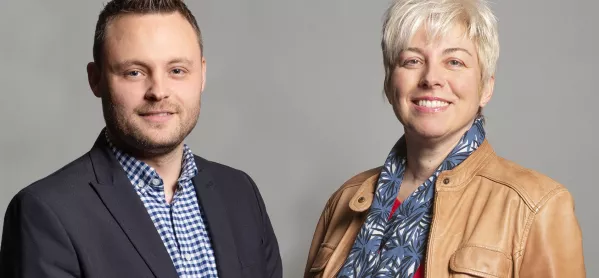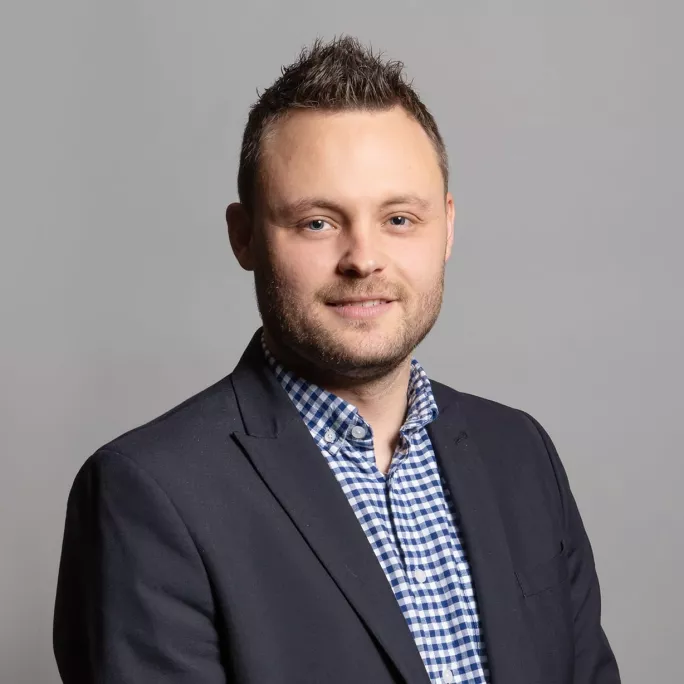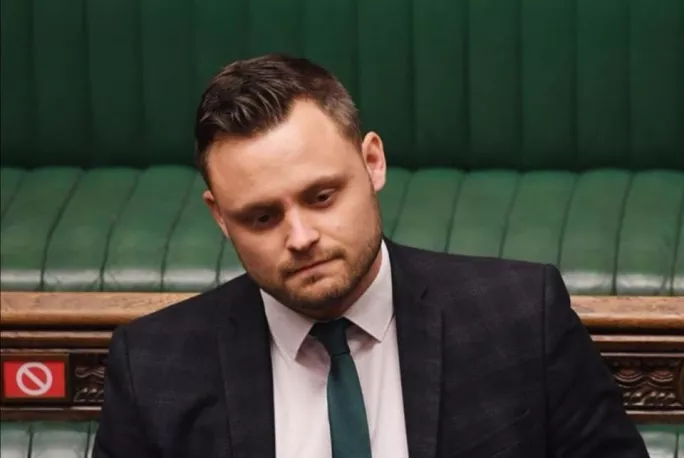- Home
- ‘No big concerns’ - meet Williamson’s FE ambassadors
‘No big concerns’ - meet Williamson’s FE ambassadors

Just hours after Gavin Williamson gave his landmark speech on the future of FE that promised a "German-style" system for England, the education secretary, without much fanfare, appointed three MPs – Lia Nici, Siobhan Ballie and Ben Bradley – as FE "ambassadors". Their role, the Department for Education said, would be to “promote and champion the FE sector”.
Williamson: England to get 'German-style' FE system
Opinion: What does 'a German-style FE system' even mean?
Background: Gavin Williamson appoints 'FE reform ambassadors'
Meet Lia Nici, MP for Grimsby

“I haven’t got any big concerns for the sector,” Lia Nici tells Tes.
“I think as with all areas, the sector needs to be able to be flexible and move with the times. And that's very much the case in the last few months with the pandemic and colleges have actually proved to be very flexible and to be able to take the initiative.
“That's something that I think other sectors of education can very much learn from. The FE sector was always called the Cinderella sector, because it always worked hard and it got the least amount of money. That makes you very innovative in how you work.”
Nici is more than familiar with how tough the FE sector has had it over the past decade: prior to becoming an MP in December 2019, she worked at Grimsby Institute for 22 years, teaching media and TV production.
She says she was attracted to FE because she wanted the opportunity to pass on her skills and bring a new generation of young people into the industry.
“The great thing about working in FE is that you can work in the industry and teach at the same time so you've got a good balance and you're bringing on a new generation of people to work in the industry,” she says.
“I managed to stay in further and higher education for such a long time because the job is very varied and you can specialise in particular areas, you're always learning, and you're learning not only about pedagogy, but you're also learning about your own industry as well and being able to shape that. We always were a forward-thinking college and that continues to be the case.”
Nici says she always had an urge to do something for Grimsby: the town she was born and raised in, and a town she “really loves”. She says it has huge potential, but that that potential has never been met.
“I thought that if people like me actually, stand up and say, I can make a change that will be a way of inspiring other people to say ‘yes we can make a change as well’. We have more people living in towns than we do cities around the country and our towns are very important for regeneration and development of new employment.
“The ‘levelling up’ agenda I'm totally committed to and anything that I can do to help with the ‘levelling up’ agenda, and in particular, Grimsby and in the surrounding area, then I'll feel, as a politician, I’ve done my job.”
'Not education for education's sake'
Nici says that she plans to use her experience in her previous job to “help and advise” the Department for Education on policy implementation. She says that she knows “exactly what happens on the ground” at colleges when new policies are put into place – and is eager to facilitate “policies that have a positive effect”.
She says she is very passionate about the importance of FE – because it always “has and continues to change people’s lives.
“It has a direct link with work, it is not education for education sake, but it's education with a view to inspiring people to think about their future careers and where their lives are going and their future earning capacity and skills,” she says.

She says that she sees FE’s potential to drive forward future technical skills – and says that it should be a whole sector approach to doing so.
“It's not just the further education colleges that can offer that future training though private education organisations. Employers can all work together to make sure that those future skills gaps are closed. What the pandemic has shown us is that there are new ways of teaching, and the new digital market of students expects to have different ways of teaching,” she says.
“I don't think it's particularly a challenge, I think it's an opportunity for us. Students expect a different way of working now, and the further education sector, and its wider sense – not just FE – colleges are more than capable of being able to develop and take on that challenge in the future.”
Nici presses the importance of filling the skills gaps – and says that there needs to be a flexible environment in which people are trained specifically for the jobs that are needed. She says it will be a “big change for colleges” – but “that for society to move forward, we need to be looking at what it is that employers need and what it is that the country needs for the future.”
Meet Ben Bradley, MP for Mansfield

“I wanted to be a teacher actually before I accidentally became a member of Parliament,” laughs Ben Bradley.
“Education is kind of top of my list and particularly important as well for my part of the world. Mansfield is a place where very few young people go to university, colleges and FE is even more important to those kids into that community.”
Bradley says he was “quite naughty” and was “kicked out” of primary school – and his parents sent him to a private school. He went to the University of Bath to study sport with the view to becoming a PE teacher – but dropped out after a year.
A few years later, he went to the University of Salford and then Nottingham Trent to study politics. He says he never had the intention to actually work in politics – but soon found himself on work experience with his local MP Mark Spencer, which then led to volunteering. After the council didn’t collect his bin one Christmas, he led a campaign that “got people really riled up”, and then saw him elected to the local council.
Bradley’s interest in FE was sparked in 2019, when a college in his consistency – West Nottinghamshire College – faced serious financial challenges. Bradley says that things “are hopefully turning around” – and that FE has become a “real focus” for him in parliament as a result. He says it was this, which then put him on the DfE’s radar.
He says he was really impressed with Gavin Williamson’s speech – and says he’s been pushing to emphasise the role of FE for a while.
“We almost push too many kids to university and they're not getting the outcomes. For many, they’d be far better off pursuing, work-based learning and technical skills, which is exactly what Gavin seems to be driving towards. It's great to be asked to be involved in it and to hopefully have a bit of input in terms of policy as well and to be able to go through these things with Gillian,” he says.
“The biggest thing I attempt to get out of this role is actually just to have that ability to directly feed in the challenges that we see and hopefully the role will give us more access to finding out about some of those challenges and changes as well on the ground.”
'Lots of change is needed'
Bradley says there are existing challenges for the sector – highlighting financial sustainability, post-Covid exams, and the changing landscape of student recruitment. He says that building the capacity of the sector – and crucially, supporting it financially– is paramount to increasing apprenticeship starts and technical routes of study.
“As it stands, FE has not had the clout to deliver on a lot of stuff that we would like. There's also within HE, some of the lower performing universities in terms of outcomes. How do we shift those into sectors and into qualifications that are perhaps more relevant to what we want to achieve, particularly with all the adult learning and retraining things that we're gonna have to focus on over the next few months and years as well. Lots of change is needed,” he says.
“And if you're going to ask FE to do more, if we're going to ask them to be a bigger part of the education piece then that's going to have to come with the financial support to do that.”

He says that independent training providers have a “huge role” to play in plugging post-Covid skills gaps, and says that it’s key to offer the “offer the right incentives for courses in key industries.”
“There's been a lot of discussion about how we can offer and get training providers to bring in those most in need of retraining and really focusing on that. I know that ministers have had a lot of discussion with the Treasury, as well. I imagine it's probably one of those that will wait until Budget time, but I hope that there'd be a lot of support there for the sector,” he says.
Going forward, Bradley says that he is keen to spend time within his own consistency and across the country widely in FE institutions to expand his insight into the sector.
”I'd like to understand this a little bit more, to really get my head around the challenges in a more practical way and be able to visit places. There’s a big opportunity to get out and visit providers outside my constituency and then make that comparison that I haven't necessarily been able to do before,” he says.
Keep reading for just £1 per month
You've reached your limit of free articles this month. Subscribe for £1 per month for three months and get:
- Unlimited access to all Tes magazine content
- Exclusive subscriber-only stories
- Award-winning email newsletters



